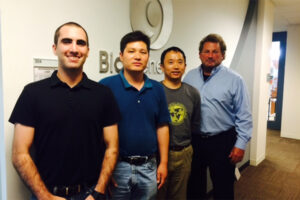Jeffrey Czajka probably didn’t think that, as a systems biology and fermentation researcher at Washington University in St. Louis, he would be quizzing customers in the grocery store about their pet food preferences.
But, in 2017, a local startup approached his adviser looking to collaborate. That June, Czajka began working with Arch Innotek, a biotech company at BioGenerator in the Cortex Innovation Center.

At Arch Innotek, Czajka works with Yechun Wang, chief scientific officer, on bioengineered microorganisms that create phytochemicals for use in foods and other products.
“When the project first started, I thought I’d be doing strain analysis and fermentation optimizations,” said Czajka, a PhD candidate in the School of Engineering & Applied Science. It’s foundational work that has to be done in any lab of the sort, but not a drastic departure from his work as a PhD student in the lab of Yinjie Tang, the Francis Ahmann Career Development Professor in the School of Engineering & Applied Science and in whose lab Czajka works studying metabolic analysis of different microbial cultures.
Soon, however, his work with Wang and Arch Innotek took him places many researchers don’t go — like the grocery store.
During the market discovery section of a four-week workshop for another NSF grant, Missouri I-corps program, participants were designing an antioxidant for use in pet foods as an “all natural” ingredient.
They had to find out what customers wanted and what prices they can pay, so they headed to the store to ask such questions as “What kind of things are important to you when you’re buying pet food?” and “Do you look at labels? If there’s another product that’s similar, what would make you choose one product over the other?”
It was the opposite of working, head down, in a lab. “It was nerve-wracking,” Czajka said, but a valuable, and, in retrospect, a fun experience.
Noting that St. Louis had just been recognized as one of the top cities for life science startups, Tang said the opportunity for students to work with small companies is good for the local economy and good for the students.
“It used to be that there were two routes after the PhD: work at a big company, or get a professor job,” Tang said. “Now they have a third route: They can start their own business.”
Read more of the story on FUSE, our website for innovation and entrepreneurship.